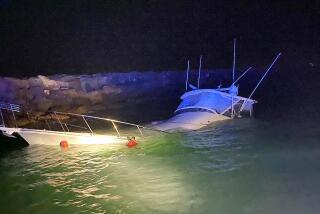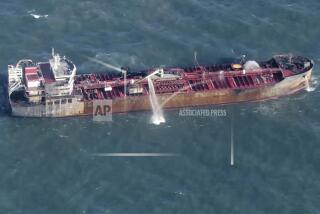Ship Crew Reports Captain Drunk; Prosecution Urged
- Share via
The Coast Guard has recommended criminal prosecution of a cargo vessel’s captain suspected of being drunk at the helm last month as his ship weaved erratically near the Long Beach harbor breakwater.
The Coast Guard’s Los Angeles Marine Safety Office said it has forwarded recommendations to the U.S. attorney’s office to charge Alan Jones, 58, a British citizen, with operating a commercial vessel while intoxicated, and with endangering his ship and those on board. Both charges carry a maximum sentence of one year in prison and a $5,000 fine.
Capt. James Card, director of the safety unit, said the recommended charges against Jones are the first time the Los Angeles office has sought criminal proceedings against a cargo vessel officer for alcohol violations.
Coast Guard officials, noting that the March 31 incident took place one week after the grounding of the Exxon Valdez in Alaska, said it served to focus attention on the pending implementation of stricter maritime rules for alcohol use.
A report on the incident, released Monday, includes a graph recording ship steering movements. The graph shows steep and rapid zig-zags. Also in the report are transcripts of radio conversations that suggest the crew of the 728-foot vessel was close to panic.
The first transcript begins with the Century Hope, which had just left Long Beach harbor, identifying itself to the Coast Guard and then abruptly warning:
“Very drunken captain. I’m the chief engineer of this vessel. Could we have a Coast Guard vessel board us? At this moment, he is weaving in and out of one of your buoy channels. . . . Yes, we have a very big problem here.”
Coast Guard Action
The captain cut off that conversation, but it was enough to make the Coast Guard scramble. The chief engineer came on the air again as a Coast Guard boat neared the Century Hope:
“We’re not very far off your breakwater, and we have a problem in that, that the three navigators are very unhappy about the state of the captain, who is very drunk, and taking the ship round in circles, and we feel it’s a danger to navigation.”
In addition to the criminal charges, Card said that the Coast Guard would seek civil sanctions against Jones, including two similar to the criminal charges and a charge that Jones had been drinking within four hours of going on duty. The maximum penalty for each of the civil violations is a $1,000 fine.
Jones could not be reached for comment.
In a statement included in the report, the captain conceded that he had “one whiskey about an hour before sailing,” but denied that he had put his ship at risk or was unfit to navigate.
“I utterly refute these allegations,” Jones stated.
Captain’s Explanation
He explained the erratic ship movements as part of an effort to calibrate navigational instruments.
But the Coast Guard report said that none of the other crew members had been involved in any navigational calibration--as standard practice would have required--and noted that Jones had admitted in a published interview that he had two drinks. The Coast Guard boarding crew said Jones had a strong odor of alcohol on his breath, bloodshot eyes and difficulty with his balance.
Alcohol tests taken 5 1/2 hours after the incident showed that he had a urine alcohol level of .09% and a blood level of .07%--above the legal limit for mariners of .04%, according to the report. The Coast Guard calculated in the report that Jones’ blood alcohol level would have been .16% at the time that his crew radioed for help.
The Century Hope, which had stopped in Long Beach harbor to take on 1,500 metric tons of fuel oil, was en route to Yokohama with a cargo of 57,000 tons of soybeans when the incident occurred. A new captain arrived, the ship’s owners posted bond for Jones and the ship left for Yokohama a few days later.
The case, said Card, “has focused the ports’ attention on the alcohol rules and is a catalyst to get the port leaders together to keep it from happening again.”
Port officials and private maritime leaders are to meet with the Coast Guard next month to discuss implementation of rules on alcohol use that include tests before hiring, after accidents and at random.
More to Read
Sign up for Essential California
The most important California stories and recommendations in your inbox every morning.
You may occasionally receive promotional content from the Los Angeles Times.













